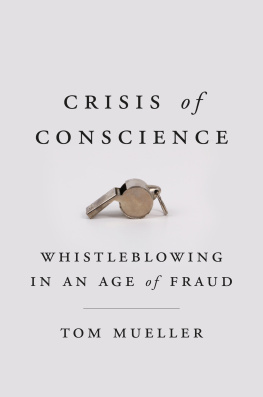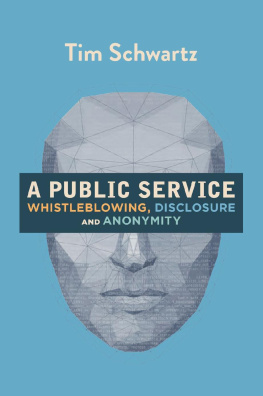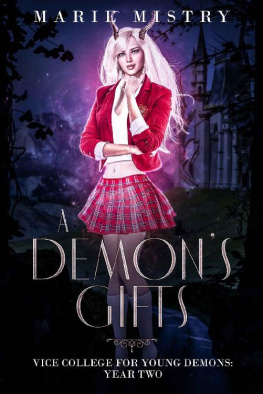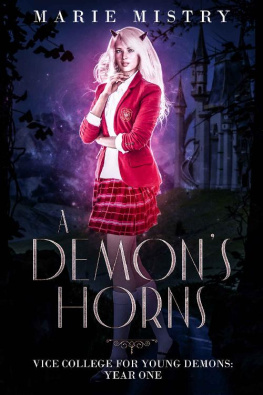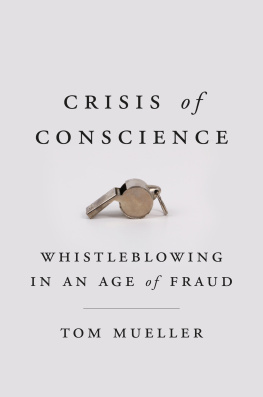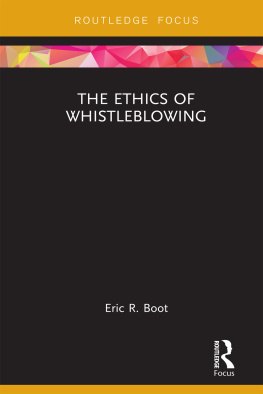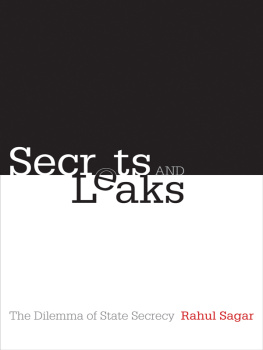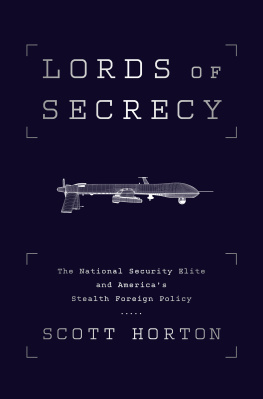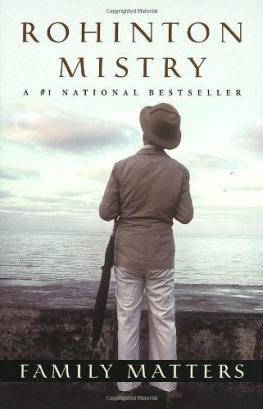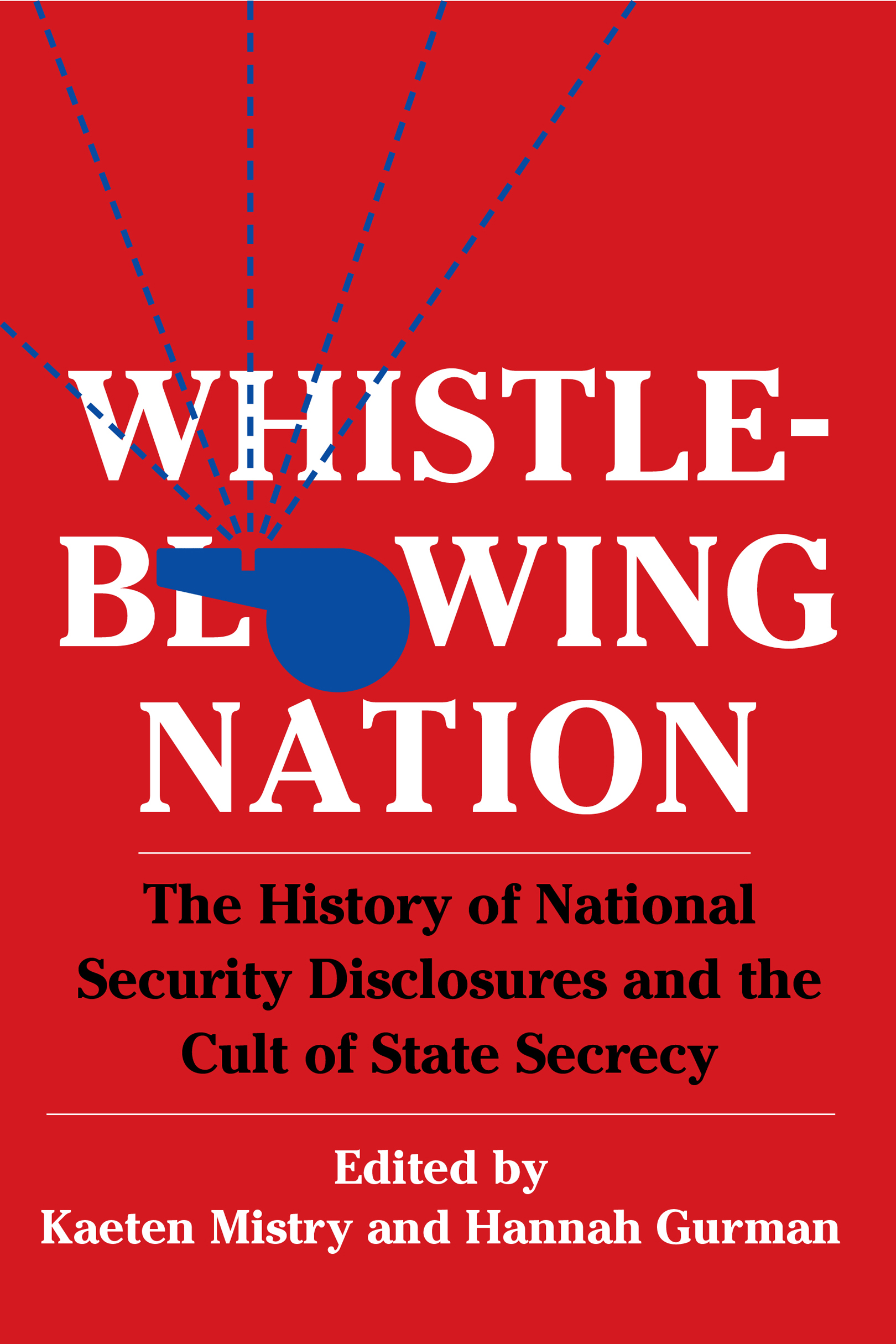Names: Mistry, Kaeten, 1980 editor. | Gurman, Hannah, editor.
Title: Whistleblowing nation : the history of national security disclosures and the cult of state secrecy / edited by Kaeten Mistry and Hannah Gurman.
Description: New York : Columbia University Press, 2020. | Includes bibliographical references and index.
Identifiers: LCCN 2019032907 (print) | LCCN 2019032908 (ebook) | ISBN 9780231194167 (cloth) | ISBN 9780231194174 (paperback)
Subjects: LCSH: Whistle blowingUnited StatesHistory. | Official secretsUnited StatesHistory. | Leaks (Disclosure of information)United StatesHistory.
Classification: LCC JK468.W54 W46 2020 (print) | LCC JK468.W54 (ebook) | DDC 353.4/60973dc23
A Columbia University Press E-book.
CUP would be pleased to hear about your reading experience with this e-book at .
T his volume is one part of a collaborative research project on the history of U.S. national security whistleblowing. Working on the project has been the most rewarding intellectual and personal experience. We are grateful to the people and organizations who enabled the journey and made it so enjoyable.
First, we would like to thank the UKs Arts and Humanities Research Council (AHRC) for its generous financial backing (grant AH/P00461X/1). At a time of tremendous financial strains on the humanities, this research simply could not have been completed without the AHRCs support. Thanks also to the University of East Anglia and New York Universitys Gallatin School of Individualized Study for providing additional assistance for the project.
We have been extremely lucky to work with so many wonderful people on this volume. It has been a stroke of good fortune to collaborate with a stellar group of scholars. Their intelligence, creativity, and commitment have given life to the book and, equally, provided companionship and good cheer on the way. This volume is a product of several dynamic and stimulating exchanges over the last few years. In many respects it is a coauthored book. The bulk of the chapters first emerged at a 2018 workshop at NYU Gallatin, where we discussed one anothers essay drafts and collectively explored the broader questions examined in these pages. Those conversations over two days were pivotal in giving shape to the book and highlighting the stakes of our research. They were also tremendous fun. Thanks to all the contributors, to Chase Madar, Anders Stephanson, and Hugh Wilford for incisive commentaries, and to Gallatin for generously hosting the event.
Several colleagues and friends have assisted us since the earliest phase of the project, providing feedback, discussing ideas, contributing to events, inviting us to give talks, offering help, and providing constructive criticism and encouragement. Lloyd Gardner, Richard Immerman, Sam Lebovic, Bevan Sewell, and Kim Phillips-Fein read umpteen drafts of proposals, bids, and chapters. We suspect Lloyd and Richard ended up contributing chapters in the hope that our queries and requests for help would slow down. They didnt, but were delighted to have included two excellent pieces by the two kindest, most generous, and most humble historians in the business. Marilyn Young was a great source of advice and support not only on this project but on our work and careers overall. Her wit and wisdom are sorely missed. We also thank Dean Susanne Wofford, Nathaniel Sikand-Youngs, David Milne, Nick Grant, Emma Long, Mario Del Pero, David Mead, Andrew Preston, John Prados, Becky Amato, DaShante Smith, Rachel Plutzer, Theresa Anderson, Mike Koncewicz, Laura Potts, Jay Sexton, Ben Wizner, Anna Myers, the staff at NYU London, and colleagues at UEA and NYU New York.
Jenny Kijowski did a marvelous job designing our project website (https://wp.nyu.edu/whistleblowing/) and was always there to help us Luddites out whenever we had questions or problems. Aaron Cedolia, KC Trommer, and their team designed a fantastic logo and created elegant posters and programs for events, often on short notice. Polly Harrison, Linda Wheeler Reiss, and Gisela Humphreys guided us through the labyrinthine world of grant budgets and spreadsheets and bravely navigated the wild transatlantic exchange-rate fluctuations. We are grateful to all of them.
A particularly satisfying part of the project has been the opportunity to discuss key questions, themes, findings, and problems with a variety of audiences. Thanks to the scholars and participants at the Society for Historians of American Foreign Relations conferences in Philadelphia and San Diego, the annual British and European Associations of American Studies gathering in London, and the Historians of the Twentieth Century United States conference in Dublin, the Trowbridge Center at the University of Illinois, and the Center for Ethics and the Rule of Law at the University of Pennsylvania. We are grateful to public audiences at talks at the 2nd Air Division Library in Norwich and the Kinder Institute on Constitutional Democracy at the University of Missouri. And thanks to all the participants of the public symposium at NYU, which was kindly cosponsored by the Tamiment Library and Gallatins Urban Democracy Lab, and the final project conference in London. These events included a wonderful mix of scholars, journalists, NGOs, whistleblowers, and members of the public. Particular thanks to Anna Myers, Tom Devine, Ewen MacAskill, Tom Drake, John Kiriakou, Edward Snowden, and all the presenters.
At Columbia University Press, Stephen Wesley has been our editor extraordinaire. He supported and guided the project from start to finish with passion, precision, and professionalism. His sound judgment and editorial talents improved many aspects of this book, especially our introduction, joint chapter, and conclusion. Equally impressive was Stephens disclosure on where to find moonshine. It was, fortunately, authorized and legal. Thanks as well to Christian Winting for editorial assistance, Michael Haskell for guiding the book through production, and Robert Fellman for superb copy editing.
Our families provided unconditional love and support throughout the project. They kept us going. We thank them for their patience during our absences, our many transatlantic Skype sessions, and for their companionship along the way. One of the greatest joys working on the project has been getting to know each others families and sharing updates on the highs and lows of daily life. We dedicate this book to Sofia, Sammy, the latest arrival to the Gurmalban clan, Sara, and Joe.


